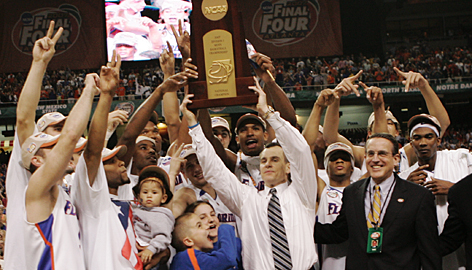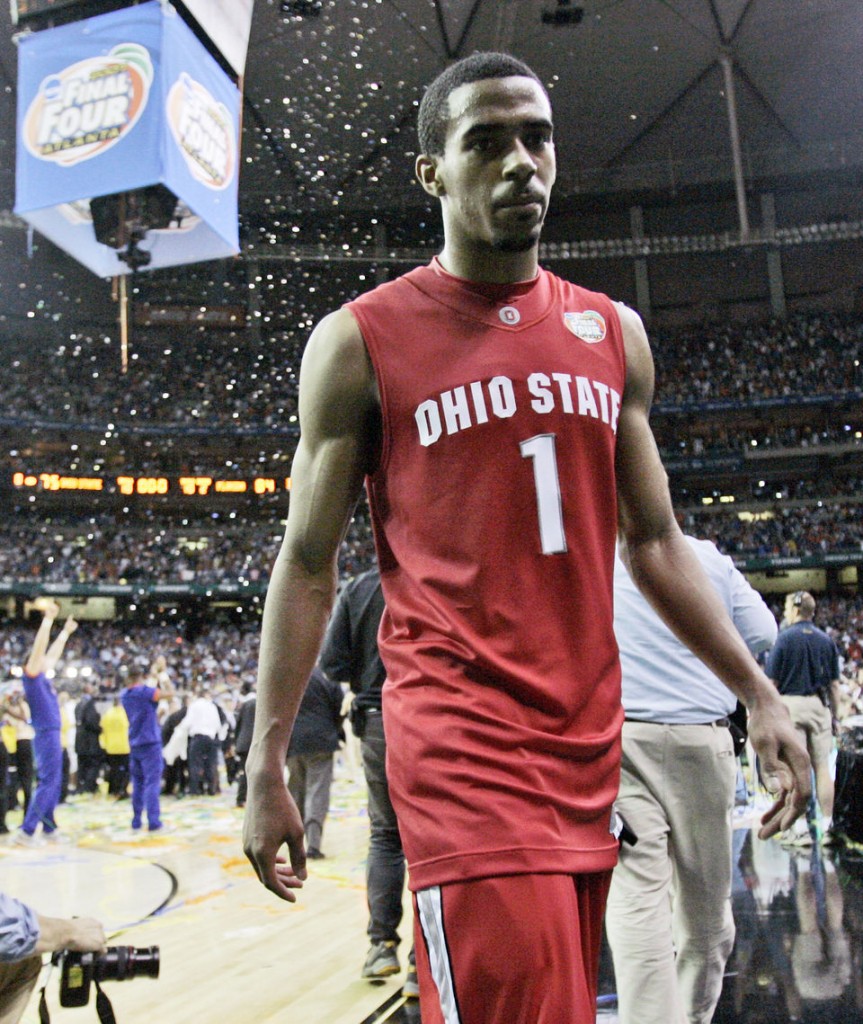Anyone who has studied the history of college basketball at an appreciable depth for a reasonable length of time knows that the 1979 Final Four helped the NBA more than any other Final Four.
Magic Johnson and Larry Bird turned the NBA from a professional sports league shrouded in shadow to a thriving entity with global reach, one that would culminate in the 1992 Dream Team and everything that meant for the expansion of international basketball.
Other Final Fours provided players, coaches, and future coaches who would eventually help to write the story of the NBA over time. Think of Pat Riley in the 1966 Final Four with Kentucky. Think of the 1982 Final Four with Patrick Ewing, Sleepy Floyd, Sam Perkins, James Worthy, Clyde Drexler, Hakeem Olajuwon, and that Jordan guy.
Let’s say a little more about that 1982 Final Four: At a very early point in time — in 1986, when Michael Jordan scored 63 points in the 1986 playoffs against the Boston Celtics, and Olajuwon helped the Houston Rockets make the NBA Finals — it was already apparent that the ’82 Final Four class was going to leave a large imprint upon the NBA. James Worthy had already become a fixture in Los Angeles with the Lakers. Floyd was a highly productive player at Golden State. Ewing was beginning to become a legendary New York Knick, anything but the bust other big-men picks would be (think Sam Bowie). In subsequent years, Sam Perkins and Clyde Drexler would make a bigger mark on the NBA, but just four and a half years after the 1982 Final Four took place, that event had already contributed a great deal to the NBA.
As we move to the central focus of this article, the 2007 Final Four did not immediately gain a pervasive level of resonance in relationship to the present-day NBA. However, the course of events over the past week and the past NBA season now cast this particular Final Four in a much more prominent light.
*
In 2011, the 2007 Final Four had left a relatively small imprint on the NBA.
The Oklahoma City Thunder had not yet reached the NBA Finals. The Memphis Grizzlies had not yet reached the Western Conference Finals. Russell Westbrook, a member of the 2007 UCLA Bruins, had not affirmed himself as a top-10 NBA player. Greg Oden of Ohio State was a bust (and remains so today). The Atlanta Hawks were not as much of a factor in the NBA as they are now. The Indiana Pacers and a big man named Roy Hibbert had not yet begun to challenge the Miami Heat in a series of contentious playoff battles in the month of May.
Billy Donovan had not yet become an NBA coach.
It’s a different world in 2015. If you look at the NBA playoffs and the team that’s going to occupy the center of the spotlight in the Association next season, the marks of the 2007 Final Four are now omnipresent. These marks are going to be enlarged in the 2015-2016 season, too… no matter what might happen.
The most central drama of the coming NBA season could very legitimately be the way Billy Donovan relates to Russell Westbrook (and, of course, Kevin Durant). In the 2007 Final Four, Westbrook had not yet become UCLA’s main backcourt threat — that would come a year later in the 2008 Final Four — but Donovan did coach against Russ in the Bruins-Gators rematch from the 2006 national title game. It’s true that Donovan is going to focus on tapes of Russ from the past few NBA seasons in order to learn more about his new point guard’s game. Yet, the fact that Donovan had to game plan in part for Westbrook in 2007 gives the Thunder’s new coach the ability to say that he’s studied the evolution of Westbrook’s game for a long time.
Billy D. can tell Russ how much his game has changed, and Russ can offer his own impressions of how his skill set has developed. This could form part of the basis for a strong relationship between the two, and that process of relationship building is the most important thing Donovan will do in Oklahoma City, especially for this next season. Opponents in the 2007 Final Four, Donovan and Westbrook will now occupy the same court in the NBA, and that pairing will stand at the heart of the story of the NBA starting next October.
As you move from the Donovan-Westbrook story and focus on other dramatis personae from the 2007 Final Four, you can see how the 2015 NBA Playoffs are being shaped by that April weekend in Atlanta, eight years ago.
After Chris Paul and Kevin Love, no NBA player’s injury-based absence looms larger right now in the playoffs than Mike Conley’s disappearance from the Memphis-Golden State series. It was acutely noticeable in Game 1 how much the Grizzlies had to have Conley on the floor. He scored 20 points in the national title game against Florida in 2007, but the Gators’ balance (reminiscent of the current Atlanta Hawks, who have a player named Al Horford — you might have heard of him in 2007) proved to be too much. Conley is authoring an important and central story in these NBA playoffs… just not in the way he’d hoped.
*
As you continue to move through the 2015 NBA Playoffs, you’ll see even more connections to the 2007 Final Four. An obvious one is Joakim Noah, a foundational player for the Chicago Bulls over the past several seasons and a player the Bulls need to be great in the just-starting East semifinal series against the Cleveland Cavaliers. Jeff Green of Memphis — who played for Georgetown in the 2007 Final Four — has to pick up the slack if the Grizzlies are to compensate for the loss or (should he return to the court) reduced efficiency of Conley against Golden State.
Speaking of Golden State, the Warriors have made Marreese Speights into a very useful player, one who has never found a better fit on an NBA roster. Speights has never averaged more points or assists per game than he has this season. His mid-range jumper is a legitimate weapon, and his free-throw percentage has never been higher. He’s having a blast, just as the Warriors are. He won the 2007 national title with Florida, but in the national title game against Ohio State, he played only six minutes and scored just two points. He’s come a long way since that game… enough to become a better pro than most of the players who took the court on that Saturday and Monday in the Georgia Dome.
One more figure from the 2007 Final Four who will be part of these next two weeks in the NBA playoffs is Corey Brewer (pictured, below).
Brewer had once hoped to be part of something special, as a member of George Karl’s last formidable Denver Nugget team, the one which won 57 games in 2013 before being upset by Golden State in the first round. When Brewer went to Minnesota for the 2013-2014 season, he had reason to think that he’d be confined in purgatory for the rest of his NBA career, but the Houston Rockets rescued him. Against the Los Angeles Clippers, he has a chance to make an important contribution in the postseason… the one he was unable to make with Denver two years ago.
*
The 2007 Final Four and the 2015 NBA Playoffs — the story of the former is magnified now that so many of its figures are prominently featured in the latter.
Florida, UCLA, Georgetown, Ohio State.
Billy Donovan, Al Horford, Joakim Noah, Russell Westbrook, Jeff Green, Mike Conley.
The story of college basketball and the story of the NBA are intersecting in a powerful way right now. It’s not 1982 or 1979 in terms of long-term significance, but the 2007 Final Four has just acquired a much larger place in the workings of the NBA and its postseason drama.



